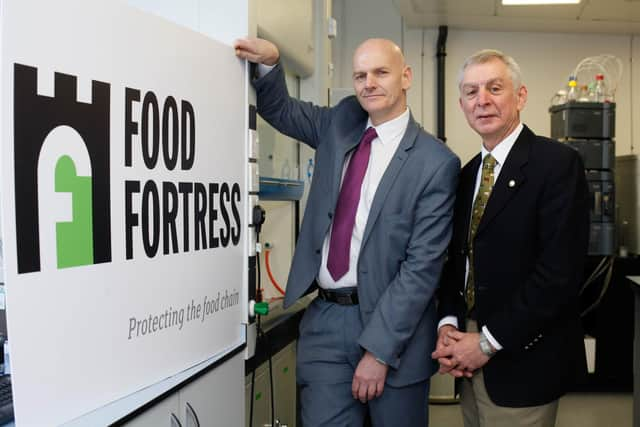Current turmoil is impacting us all
and live on Freeview channel 276
In addition, the recent heatwaves have impacted crop yields, adding further pressure to a very finely balanced supply and demand situation, with the European maize crop forecast to be reduced by around 15 million tonnes. This highlights the risk posed to the food system by climate change.
Northern Ireland’s unique feed surveillance scheme has proved invaluable in ensuring that quality is not compromised, or animal performance impaired, in the event of supply chain disruption. The Food Fortress network involves all of the Province’s feed producers collaborating in a programme of sampling and testing for contaminants which present a threat to food safety for consumers or have the potential to impact on livestock performance.
Advertisement
Advertisement
Expert guidance as to the contamination risks from feed materials is supplied by the Institute for Global Food Security at Queen’s University Belfast, whose researchers are constantly scanning for emerging risks to the food and feed chains. Mycotoxins are a major threat - with grain and grain by-products the most common source. Background levels will be low in a healthy crop harvested in good conditions but in wet seasons moulds develop on the grain and mycotoxins will flourish. As temperature and moisture are the most important factors influencing mould growth, climate change is expected to exacerbate the presence and risk of mycotoxins.


According to Robin Irvine, Director of Food Fortress, measurement and mitigation of the mycotoxin risk is a major priority for feed producers - it is the key to feed efficiency and consistent livestock performance.
“We analyse around 30 samples of finished feed every month for mycotoxins and the results are shared with Food Fortress members.
“Guidance on the safe use of raw materials and the formulation of rations to ensure optimum performance from the target livestock is also issued as appropriate. This level of surveillance and management of the mycotoxin risk is unique to Northern Ireland and brings significant benefits in terms of efficiency and profitability of production.
Advertisement
Advertisement
“The environment is also a winner as mycotoxin management prevents performance and animal health being compromised, thus lowering emissions from livestock production.
“We are committed to developing our awareness and understanding of the mycotoxin risk to be in a better position to mitigate it.
“The Queen’s University risk assessment highlights the top 10 mycotoxin risks occurring in feed materials and these are covered in the monthly screening program with an extended horizon sweep for masked mycotoxins and emerging strains carried out on a regular basis.
“The programme extends to cover the risk of contamination from heavy metals such as arsenic and mercury. Dioxins are also included as well as an extensive sweep for residues from over 300 plant protection products.
Advertisement
Advertisement
“We are very aware of the potential threats from a wide range of contaminants and work closely with DAERA Feed Inspectorate and FSA as well as Queen’s University to assess emerging risks. The relationship with DAERA is particularly important and involves a formal protocol for sharing information and for dealing with contamination events which breach the feed regulations to ensure swift action to protect the integrity of the supply chain.”